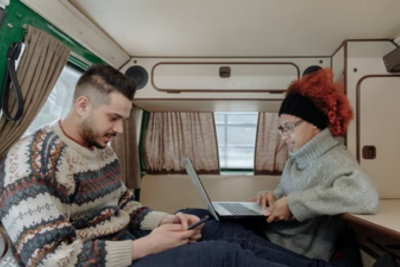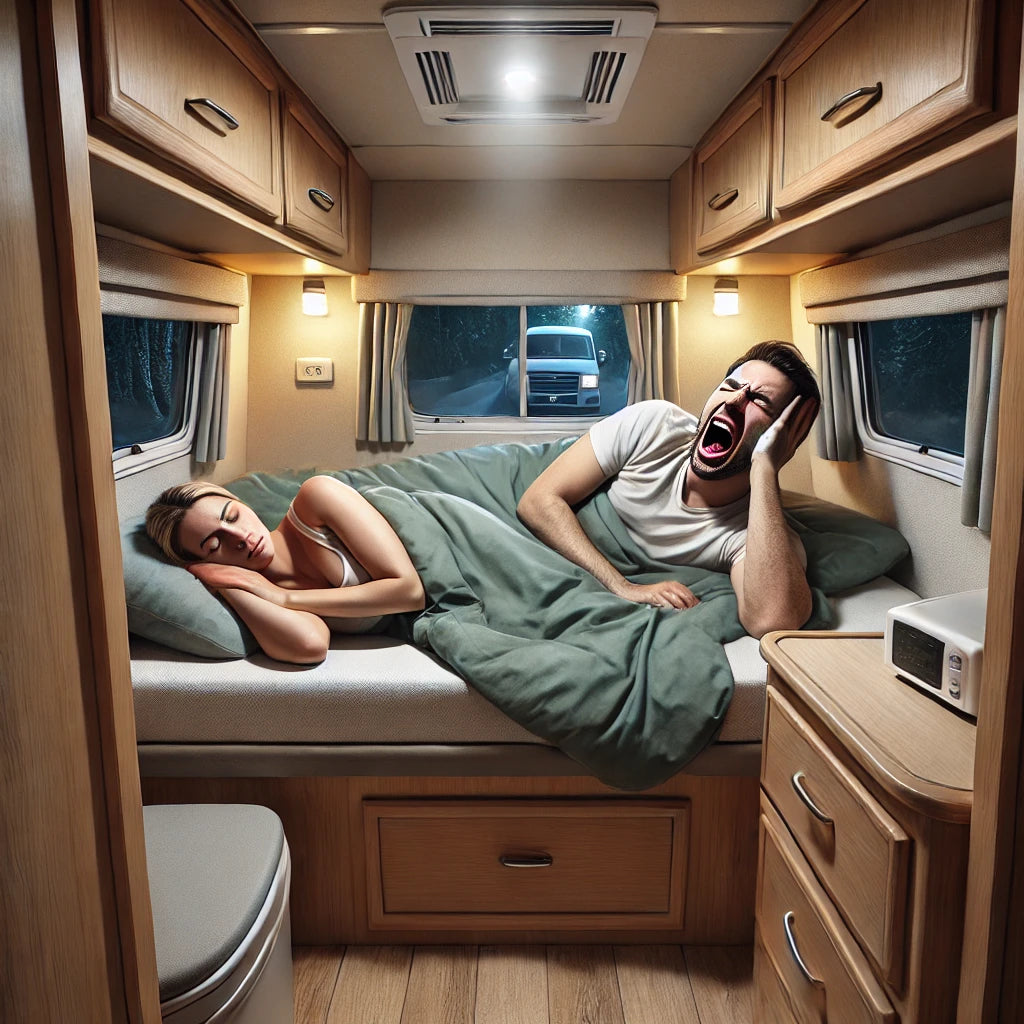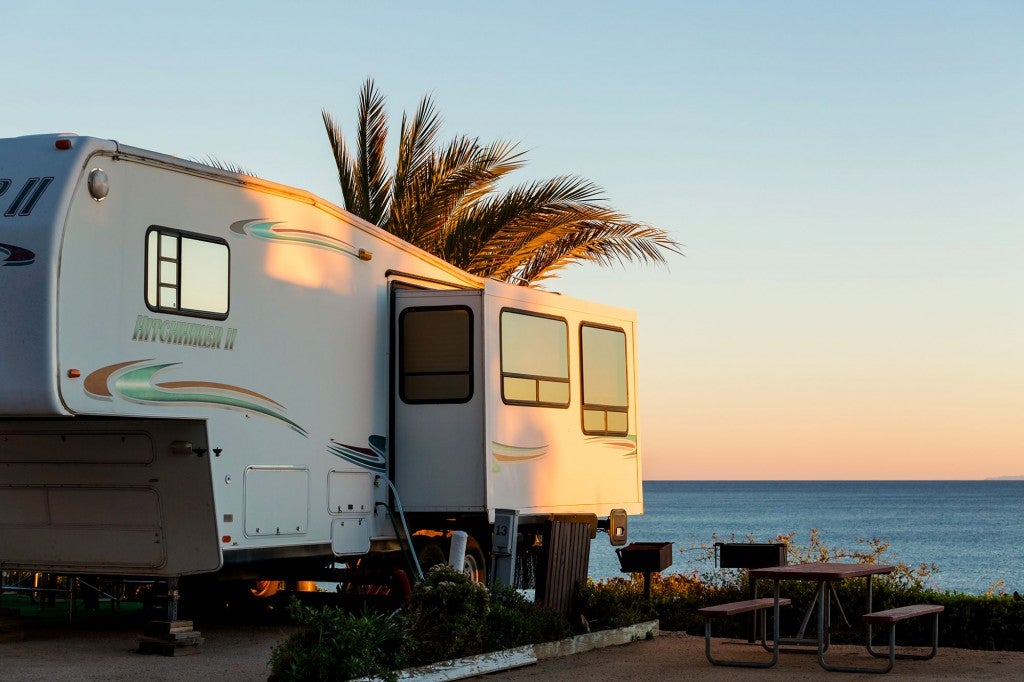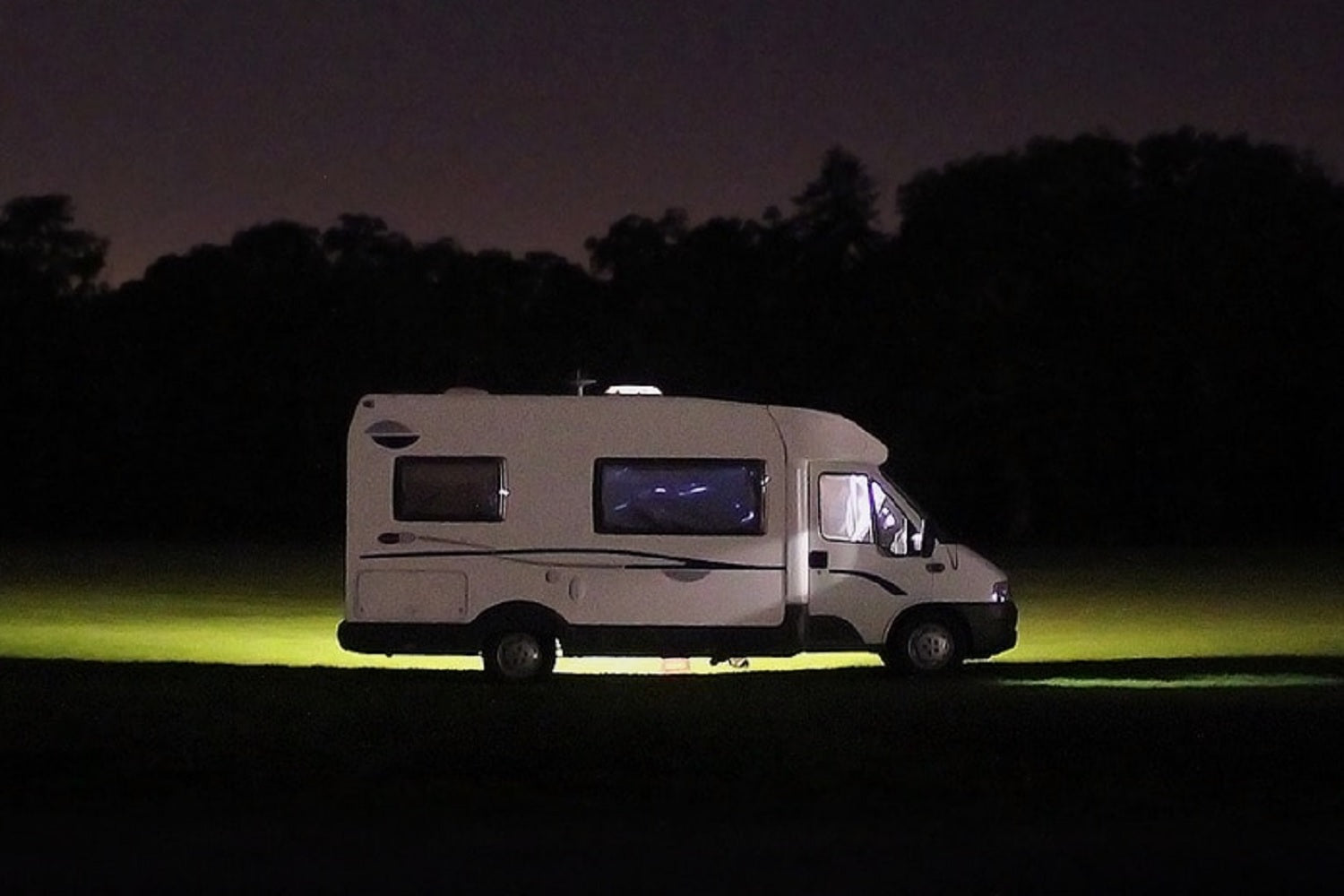
Daytime Sleep Challenges for Nomads
When it comes to sleep, RVers face unique issues. A key challenge is of course, the ever-present external noise that prevents relaxation—let alone daytime naps… or the more elusive “8 hours”. This post will focus on daytime sleep challenges for nomads and other RVers—and what you can do to get good quality sleep in your RV. This includes…
- Creating the right sleep environment
- Establishing a routine and sticking to it
- Preparing your body for daytime sleep
- Working with your chronobiology
Leaving the 9-to-5 behind, exploring the country, meeting new people—giving more attention to the things that matter most to you… is enticing and creates a sense of freedom. It can also help foster a better work/life balance. But there’s usually a learning curve in adapting to the nomad life…
Nomadism—freedom… or not so much?
According to research, the Digital Nomad experience does not necessarily equate to completely carefree autonomy. It suggests, rather, that this style of living and working requires one to exercise various levels of discipline.
And here we all thought it was simply the great escape.
Truth is, the lines between leisure and work do not magically dissipate when you take your job on the road, and mixing work with play can be difficult for a variety of reasons, such as:
- Disrupted sleep patterns—causing tiredness, poor mood and weakened immune systems.
- Distractions and lack-of-focus—like when leisure pursuits look more fun than the work that’s due.
- Losing perspective and producing low-quality work—which can compromise your livelihood.
- Unexpected stressors that come with your exciting new lifestyle.
Embracing business disciplines, like time management—and exercising lots of self-control—will help ensure this new carefree way of life won’t turn into a prison of your own making.
Be sure to start practicing discipline from the get-go. It will set you up for a more successful—and happier, nomad life.
Note: These tips are also useful for non-RV people who need to get sleep during the day due to night shift work—so keep reading...
Create a personalized sleep space that's perfect for daytime sleeping—make it your cozy sleep sanctuary...

Creating the right sleep environment
Daytime sleep challenges for nomads can be largely managed by creating the perfect daytime sleeping environment. Pick a space and make it your sleep sanctuary…
Make it dark—Sleep-friendly spaces require an absence of light, and this can be difficult if you have lots of windows. Look to blackout curtains and eye masks to solve this problem.
Digital devices emit blue light—cell phones, computers and TVs don’t belong in your sleep space.Try to avoid blue light exposure for at least an hour before you lie down to sleep.
Maintain the temperature—Sleep experts recommend a temperature range of 60-70 degrees Fahrenheit. Where you park your RV can make a big difference in maintaining your inside temp. If it’s warm out, try to park in the shade (this can also help with keeping the light out).
Keep it quiet—Road noise, people yacking, dogs barking, music blaring…noise disturbs your peace and stresses you out which adds another layer to your sleep challenges. Noise masking earbuds are a key advantage to better sleep in your RV.
Noise tends to be the number one complaint from RVers. With SoundOff earbuds, you simply don’t hear those noises anymore—and they work double-duty during your work time. Our earbuds play a calming pink noise which will not only block out intrusive sounds but will help you focus so you can get your work done—then you can get on with the fun stuff.
Say Yes to comfort—You must be comfortable to relax and fall asleep. Don’t skimp on the cozy bedding and comfy PJs. You might also try some essential oils that smell nice and promote sleep.
Bottom line, if it doesn’t make you feel relaxed and ready to sleep when you enter, you still have some work to do on your sleep space.

Two of the biggest challenges to daytime sleep are controlling light and temperature. Eye masks, blackout curtains—and finding the right parking space can help you sleep better in your RV.
Establishing a routine and sticking to it
Here’s where the discipline starts. Sleep challenges for nomads can be overcome by making sleep a priority.
That means creating a daily plan for getting your best sleep—and being consistent in your follow through. These proactive, sleep promoting steps will help train your body for better sleep…
- Figure out your best sleep schedule—decide on a bedtime and wake-up time and as much as possible, go to bed at the same time each day, and wake up at the same time each day. Even on weekends. This helps regulate your natural sleep-wake cycle.
- Hydrate when you get up in the morning and be sure to get adequate fluids during the day.
- If you drink coffee or other caffeinated beverages, cut them off by early afternoon.
- Set a time for moderate daily exercise—be sure it’s not close to bedtime, so you’re not too stimulated to fall asleep.
- Establish times for your meals, and eat them at the same time each day
- As much as possible, avoid naps. If you really need them, keep them to no longer than 30 minutes. Napping longer can make it harder to fall asleep when you’re ready for bed.
- Build in some social time—a sense of community helps ward off depression—and most of the time, it’s fun.
- Cut off alcoholic beverages a few hours before bed
- Create a wind-down routine to relax you and help you fall asleep. Do it the same time each day.
Work with your biology
Don’t be intimidated by the words routine, schedule, and discipline. There’s science behind this and it’s called chronobiology. Learning to work in cooperation with your personal biorhythms will help you sleep better, feel better, and be more productive. The gist is that your body is programmed to do certain tasks better at certain times of the day based on your chronotype. For best results in developing your daily routine, discover your chronotype’s “best times to do everything”. You can start with this free quiz.
Preparing your body for daytime sleep
In addition to the steps above, one of the best things to do to support your sleep cycle is to be mindful of what you put in your body. This includes of course, avoiding things we know to be toxic, addictive substances, and even certain medications.
But what I’m mainly talking about is food. A wide variety of foods help support your sleep and we should all be consuming them. Others, however, interfere with sleep by causing indigestion, acid reflux, or inflammation when eaten before bed. These should be avoided in the hours before sleep time—or, depending on your individual system, may need to be eliminated from your diet altogether.
Quantity and timing are also factors, particularly with shift work. Experts recommend having your main meal in the middle of the day (not the middle of your shift) if your work shift is in the afternoon.
Whereas night shift workers should consume a light meal during their shift and follow it up with a moderate breakfast. Again, eating meals at the same time each day is encouraged, regardless of your specific shift.
Feed your sleep!
We’ve done deep dives on the best foods for sleep in the past. Check out Better Sleep Through Nutrition where you’ll find the best foods to feed your sleep—including which foods supply particular vitamins and minerals to aid sleep.
For instance, vitamin B12 aids sleep-wake cycle maintenance by helping sync circadian rhythms. Rather than taking a supplement, boost your sleep by consuming B12 through whole foods like these:
Apples / Bananas / Beetroot / Blueberries / Eggs / Dairy / Fish / Mango / Meat / Nutritional Yeasts / Shellfish
Pack your diet with nutrient rich whole foods to enjoy better sleep and a healthier life!

Mind your gut.
Maintaining a healthy gut will support not only your health and sleep, but it will also supply these key benefits for digital nomads:
- Consistent Energy
- Lower Stress Levels
- Mental Clarity
Slay your nomad sleep challenges and avoid the unpleasant effects of an unhealthy gut—including…
- Autoimmune conditions
- Bloating / Gas / Heartburn
- Brain Fog / Chronic Fatigue
- Insomnia / Migraines
- Mood Changes / Weight gain
- … and more.
Learn more about how keeping your gut healthy helps you sleep better, feel better and function better— including how to do a 3-day gut reset in Gut Health and Sleep.
You've got this...
Digital Nomads have been known to run themselves into the ground—which kind of defeats the whole idea of simplifying your existence.
But who wouldn’t be distracted by beautiful surroundings and the lure of new experiences. Leaving too little time to complete your work tasks, however, is going to stress you out and burn you out.
Learning to balance your schedule responsibly may take time—and more effort than expected. It will be worth it.
While work typically isn’t as interesting as adventuring, it still has to get done—and done well if you’re depending on it to make your living. Being disciplined with your time means getting adequate sleep to fuel your brain and body.
Make friends with the idea of routine, schedules, and discipline to get more out of your exciting nomad lifestyle.
We help people sleep.
Better sleep means a better You. Try our amazing, noise blocking, mind calming, earbuds risk-free for 30 nights. You’ll be glad you did.
See you next time…

































